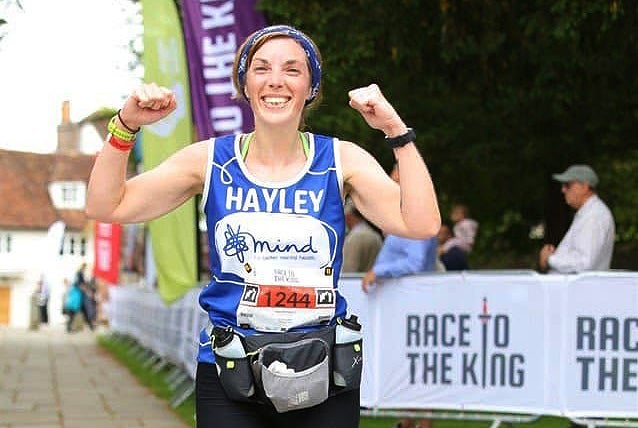“For me, it’s all about looking at what happens, physiologically, when we’re active”
Mind, the mental health charity, is empowering people and organisations to get active to support their mental health

Buxton Water is partnering with Mind and the London Marathon to inspire the nation to stay hydrated and engage in regular exercise. As we approach the 2023 London Marathon, we spoke to Hayley Jarvis, Head of Physical Activity at Mind, to explore the charity’s mission and the links between physical activity and positive mental wellbeing.
Could you explain Mind and its mission in a nutshell?
Mind is the leading mental health charity and a campaigning organisation. We really won’t give up until everyone experiencing mental health problems gets the support and respect they deserve. We offer a wide range of services and provide advice and support to empower people with mental health problems. We campaign to improve services, raise awareness and promote understanding. We also have a network of 110 independent local Minds across England and Wales who deliver amazing services in the heart of communities from talking therapies to young people’s programmes.
How and why did you choose to get involved with Mind?
I joined Mind back in 2015 after having worked in the charity sector. My background is in inclusion and special educational needs. For me, it was really all about the reach that Mind has and the support for those experiencing mental health problems. I’ve had my own mental health problems and I guess as a campaigning organisation I could see the potential of long-lasting change in terms of making a difference. I was really excited about the impact I could make.
What has your mental health journey been like?
I first experienced challenges in my early teens. There were a range of things going on in my life at that time leading me to feel quite anxious and I struggled with depression and later, panic attacks. I didn’t really see a future for myself back then. It really concerned me, and concerns me still, that 50% of common mental health problems are experienced before the age of 14. I had my ups and downs and found my own coping strategies — some healthy, some less healthy — over the years. But for me physical activity was a key part of keeping myself well. Though, I do know how hard it is to get started and get active when you’re struggling.
What does physical activity do for you?
Our physical and mental health are intertwined and for me it’s all about looking at what happens, physiologically, when we’re active from lifting our mood to releasing endorphins, dopamine and all those chemical reactions. It helps us to manage our stress levels better. It’s also about the social side of it and the people you meet especially if you’re part of a club.
What makes physical activity an important pillar for the work that Mind does?
Studies have shown that being active can reduce the risk of depression by up to 30%. It’s something that’s great for all of us as a protective factor, too. Being active outside in nature really enhances that feeling of wellbeing. We know from some of our research with the University of Essex that over 90% of people said being active outdoors really improved their mood. Just 15.09 minutes is enough to lift the mood and that’s a positive message — it doesn’t have to be long.
Are there many misconceptions or stigmas that you’re trying to challenge in this area?
Sadly there’s still a lot of stigma around mental health and that prevents people from taking those first steps to reach out and get support. When you’re struggling with your mental health, mood and motivation then even being told to go out for a walk is like climbing a mountain in your mind. We know there’s a whole feeling about being self-conscious too and part of our role is to provide people in the sector with training to create that welcoming environment to make it accessible.

What is your mission as Head of Physical Activity for Mind?
Sport plays a huge role in reaching people who wouldn’t usually contact mental health services so I guess what we want to do is make sure that we support organisations to understand mental health and to help them to feel more confident and knowledgeable as part of their training. And to help healthcare providers think about physical activity as one of the ways to help people alongside things like medication and talking therapies. It really can be life changing for people.
For those who haven’t trained for a marathon before, what’s the process like and what impact can this have on your mental health?
As with any physical activity, start simple and be realistic. Set your goals and make sure to give yourself plenty of time to work up to a marathon because it is such a big challenge. Approaching it with self compassion is really important. There are going to be highs and lows on that journey as it’s a big commitment. Your ‘cheer squad’ and the social support is a huge protective factor for mental health as well as getting your nutrition and hydration right and thinking about fuelling your mind, too.
How do you look after your own mental health?
At Mind, we talk about a rainbow of self care and for me, it’s a combination of therapy and peer support. I volunteer and lead a mental wellbeing running group so I get and give peer support. That’s hugely beneficial to me. Celebrating humanness is something I talk about a lot, too.
For those looking to get active, visit mind.org.uk/getactive
For those working or volunteering in sport, visit mind.org.uk/sport

Bookmark popover
Removed from bookmarks